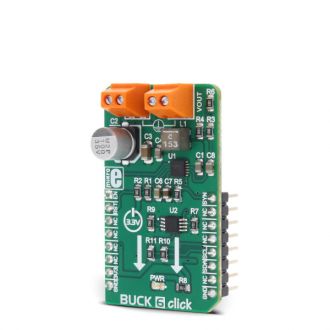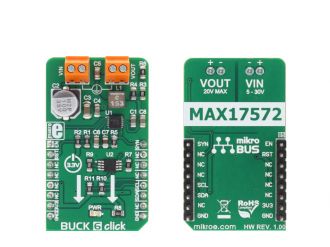
We strongly encourage users to use Package manager for sharing their code on Libstock website, because it boosts your efficiency and leaves the end user with no room for error. [more info]

Rating:
Author: MIKROE
Last Updated: 2018-03-19
Package Version: 1.0.0.0
mikroSDK Library: 1.0.0.0
Category: Buck
Downloaded: 5725 times
Not followed.
License: MIT license
BUCK 6 click is an advanced synchronous DC-DC step down (buck) converter, with a very wide input voltage range and reasonably high output current.
Do you want to subscribe in order to receive notifications regarding "BUCK 6 click" changes.
Do you want to unsubscribe in order to stop receiving notifications regarding "BUCK 6 click" changes.
Do you want to report abuse regarding "BUCK 6 click".


Library Description
The library contains all the necessary functions to have complete control over BUCK 6 click board. Control over PWM is not included in the library.
Key functions:
Examples Description
The demo application is composed of three sections:
void applicationTask()
{
buck6_setMaxVoltage(_BUCK6_MAX_RANGE_2500mV);
Delay_ms( 3000 );
buck6_setMaxVoltage(_BUCK6_MAX_RANGE_5000mV);
Delay_ms( 3000 );
buck6_setMaxVoltage(_BUCK6_MAX_RANGE_7500mV);
Delay_ms( 3000 );
buck6_setMaxVoltage(_BUCK6_MAX_RANGE_10000mV);
Delay_ms( 3000 );
buck6_setMaxVoltage(_BUCK6_MAX_RANGE_7500mV);
Delay_ms( 3000 );
buck6_setMaxVoltage(_BUCK6_MAX_RANGE_5000mV);
Delay_ms( 3000 );
}
Other MikroElektronika libraries used in the example:
Additional notes and information
Depending on the development board you are using, you may need USB UART click, USB UART 2 click or RS232 click to connect to your PC, for development systems with no UART to USB interface available on the board. The terminal available in all MikroElektronika compilers, or any other terminal application of your choice, can be used to read the message.